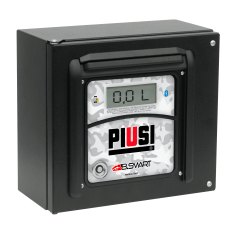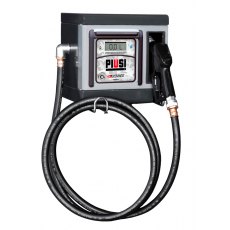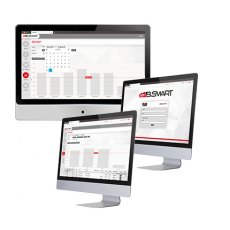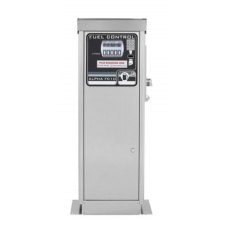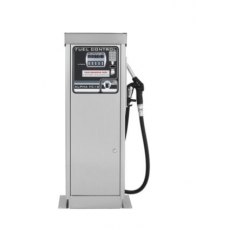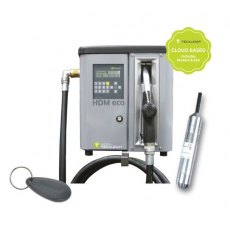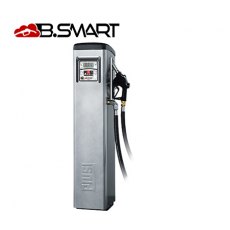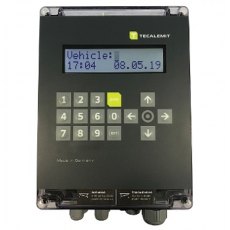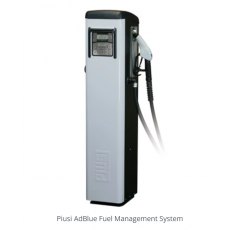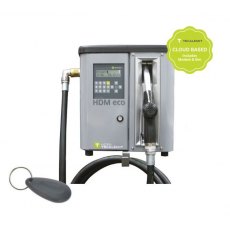Fuel Management Systems - what are they?

In today's fast-paced world, efficient fuel management is crucial for businesses that rely on fuel for their operations. Whether it's a logistics company, a construction firm, or a fleet of vehicles, a Fuel Management System (FMS) can provide the necessary tools to monitor, control, and optimise fuel usage.
What is a Fuel Management System?
Fuel management systems are a software solution designed to monitor, manage, and optimize the fuel consumption and storage. It provides real-time data on fuel usage, helps prevent fuel theft, and analysis of consumption patterns to enhance efficiency. By implementing an FMS, organisations can ensure accurate fuel tracking and reporting, leading to significant cost savings and improved operational productivity.
Applications for Fuel Management
- Transport and Logistics
- Construction
- Agriculture
- Mining and Oil & Gas
- Government and Municipalities
Below are some components of a fuel management system and what they do.
1. Fuel Pump
The fuel pump is a vital component in a fuel management system, responsible for transferring fuel from storage tanks to the dispensing point or directly to the engine of a vehicle or machinery. Its primary function is to maintain an adequate flow of fuel while ensuring that the pressure remains within optimal ranges for efficient operation.
In various fuel management applications, the pump serves multiple purposes. For instance, in a fleet management scenario, fuel pumps are used to dispense fuel into vehicles at refuelling stations or depots. These pumps can be equipped with flow meters to accurately measure the amount of fuel dispensed, thus providing data for tracking consumption and managing inventory.
Additionally, fuel pumps can be integrated with electronic control systems, allowing for automated fuelling processes. These systems can include features such as authorisation controls, where only authorised personnel can access fuel, and automated reporting, which logs each fuelling transaction for accountability and auditing purposes.
Fuel pumps also play a crucial role in maintaining fuel quality. By ensuring that fuel is delivered at the correct pressure and flow rate, they help prevent issues such as vapour lock or fuel starvation in engines. Furthermore, many modern fuel pumps are designed with filtration systems to remove contaminants, thereby protecting the integrity of the fuel and the equipment it powers.
Fuel pumps are essential for the effective operation of fuel management systems, enabling accurate dispensing, maintaining fuel quality, and ensuring the smooth operation of vehicles and equipment.
2. Fuel Filter
A fuel filter is designed to remove impurities and contaminants from fuel before it reaches the engine or fuel injection system. Its primary function is to ensure that only clean, high-quality fuel is delivered to the engine, which is essential for optimal performance and longevity of the equipment or vehicles being powered.
Within the fuel management system, the fuel filter plays a significant role, maintaining the overall efficiency and reliability of fuel usage. Contaminants such as dirt, rust, water, and other particles can accumulate in fuel tanks and storage systems over time. If these impurities are allowed to enter the engine, they can cause a range of problems, including reduced fuel efficiency, increased emissions, and even severe engine damage.
Typically located between the fuel tank and the engine, and they can vary in design depending on the type of fuel being used and the specific requirements of the engine. Some filters are disposable and need to be replaced regularly, while others may be designed for cleaning and reuse.
In addition to protecting the engine, fuel filters contribute to the overall effectiveness of a fuel management system by ensuring that fuel quality is consistently monitored and maintained. Many modern fuel management systems include sensors that can detect a drop in fuel quality or an increase in pressure drop across the filter, triggering alerts for maintenance or replacement. This proactive approach helps to prevent downtime and ensures the smooth operation of vehicles and machinery
3. Fuel Injector
The fuel injector, within the Fuel Management System, is responsible for delivering precise amounts of fuel directly into the engine's combustion chamber. Its primary function is to atomise the fuel, creating a fine mist that mixes effectively with air for optimal combustion. This process is critical for achieving efficient engine performance, reduced emissions, and overall fuel economy.
In today's fuel management systems, fuel injectors are electronically controlled, allowing for precise timing and quantity of fuel delivery based on various engine parameters. The injector receives signals from the vehicle's Engine Control Unit (ECU), which monitors factors such as engine speed, temperature, and load. This real-time data enables the injector to adjust the fuel flow dynamically, ensuring that the engine receives the optimal fuel-air mixture under varying operating conditions.
By ensuring accurate fuel delivery, fuel injectors play a crucial role in enhancing engine efficiency. An adequately functioning injector can lead to improved throttle response, increased power output, and lower fuel consumption. Conversely, clogged, or malfunctioning injectors can result in poor engine performance, rough idling, and increased emissions, which can negatively impact the overall effectiveness of the fuel management system.
In additional to their performance benefits, fuel injectors contribute to longevity of the engine. By promoting complete combustion and reducing the build-up of carbon deposits, they help maintain engine health over time. Therefore, regular maintenance and monitoring components of any effective fuel management strategy, ensuring optimal performance and reliability.
4. Fuel Pressure Regulator
Tasked with maintaining the appropriate fuel pressure within the fuel delivery system, the fuel pressure regulator is designed to ensure that the fuel injectors receive a consistent and optimal pressure, which is vital for the engine to operation and perform efficiently.
The regulator works by controlling the pressure of the fuel coming from the fuel pump. It continuously monitors the fuel pressure in the fuel rail and adjusts the flow of fuel back to the tank as needed.
5. Engine Control Unit (ECU)
Acts as the central processing unit for the entire fuel management system. It collects data from various sensors and adjusts the fuel injector pulse width and timing according to the engine's operating conditions.
6. Fuel Monitoring Hardware
Encompassing the devices and technologies that gather, measure, and report data related to fuel usage and storage, these components work in conjunction with software to provide a comprehensive view of fuel management, enabling you to optimise fuel consumption, reduce costs, and enhance operational efficiency.
Flow Meters
In Fuel management systems, flow meters help track fuel consumption in real time, allowing you to monitor how much fuel is being dispensed or consumed. This data is critical for identifying trends, detecting inefficiencies, and preventing wastage. Flow meters can be integrated with software platforms to provide automated reporting and alerts, making it easier to manage fuel resources and effectively.
Level Sensors
By providing real-time data on fuel levels, level sensors help organisations avoid shortages and maintain optimal inventory levels. They can trigger alerts when fuel reaches low levels, enabling proactive replenishment and preventing operational disruptions. Additionally, level sensors can assist in compliance with safety regulations by monitoring for overfills or leaks, thus protecting both the environment and integrity of the fuel storage system.
Temperature Sensors
Monitoring temperature, these sensors help you maintain optimal conditions for fuel storage and usage. For example, if the temperature of the fuel rises above a certain threshold, it can indicate a potential problem, such as overheating equipment or a risk of fuel degradation. Integrating temperature sensors into a fuel management system allows for better control over fuel quality and performance.
Data Loggers
In a fuel management system, data loggers (devices that record fuel usage and environmental conditions over time) play a vital role in providing historical data that can be analysed to identify trends, inefficiencies, and potential areas for improvements. This information is invaluable for decision-making processes, helping Fuel Management System holders understand their fuel usage patterns, optimise purchasing strategies, and enhance overall fuel management practices.
RFID Technology
Radio Frequency Identification (RFID) technology streamlines data collection and reduces the risk of human error. It enables companies to maintain accurate records of fuel consumption, monitor for unauthorised usage, and improve accountability. Additionally, RFID systems can integrate with software solutions to provide real-time monitoring and reporting capabilities.
7. Software Platform
The software platform in a fuel management system helps monitor, analyse and managing fuel usage. It serves as the central hub where data collected from various hardware components is processed, analysed, and reported.
Below is a list of key components of a fuel management software platform:
- Data Integration and Centralisation
- Real-Time Monitoring and alerts
- Reporting and Analytics
- Inventory Management
- Compliance and Audit Trails
- user Access and Security
- Mobile Access
- Integration with Other Systems
8. Data Integration Tools
Data integration tools facilitate the seamless flow of information between various hardware components and software applications. These tools enable companies to consolidate and analyse data from multiple sources, providing a comprehensive view of fuel usage and inventory management.
With various hardware components used in fuel management designed to collect data in real time, the data is then collected into a central repository. This allows for a unified view of fuel operations, enabling companies to track usage patterns, inventory levels, and operational efficiency in a format which is easy for users to drive meaningful insights from.
These tools can either be cloud based or downloadable from Fuel Tank Shop. The cloud-based system, allows companies to store and process data in the cloud, providing flexibility and scalability. Cloud integration tools enable real-time data access from any location, facilitating remote monitoring and decision-making. They can enhance collaboration among teams, as stakeholders can access a centralised data from different devices.
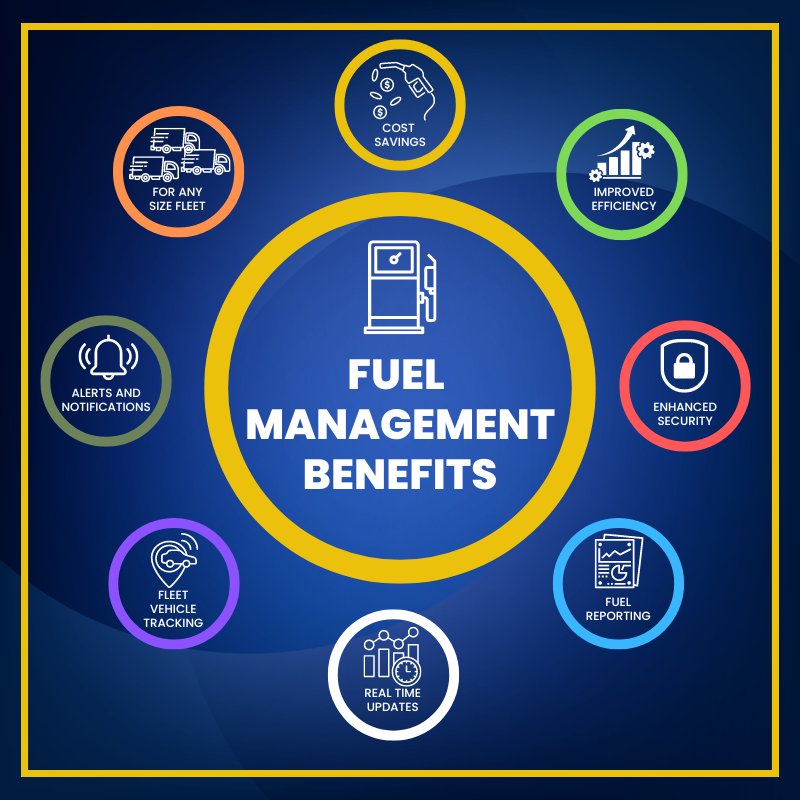
Different Types of Fuel Management Systems
- On-Site Fuel Management System - Ideal for organisations with fuel storage tanks, these systems monitor fuel levels and usage at the site.
- Fleet Fuel Management Systems - Tailored for businesses with vehicle fleets, focusing on tracking fuel consumption, mileage, and vehicle performance.
- Cloud-Based Fuel Management Systems - A system which stores data in the cloud (a network of servers that store data, run applications, and deliver services over the internet), offering flexibility and remote access to information. No need to install any software as preinstalled
- Mobile Fuel Management Systems - Designed for companies that need to manage fuel usage in the field, these systems provide real-time tracking and reporting through mobile apps.
- Integrated Fuel Management Systems - Combine various functionalities, including inventory management and compliance tracking, to provide a comprehensive fuel management system.
Cloud Based Systems
(£4,244.33 inc VAT)
Downloadable Systems
(£1,143.76 inc VAT)
(£3,996.85 inc VAT)
A Fuel Management System is an invaluable tool for companies looking to optimise fuel usage, reduce costs, and improve operational efficiency. By understanding the various applications, benefits, and components of FMS, you can make informed decisions about implementing a system that best fits your needs. Whether for a fleet of vehicles or heavy machinery, adopting an FMS can lead to significant improvements in fuel management practices.
Read More From Fuel Tank Shop
Bespoke Diesel Tanks
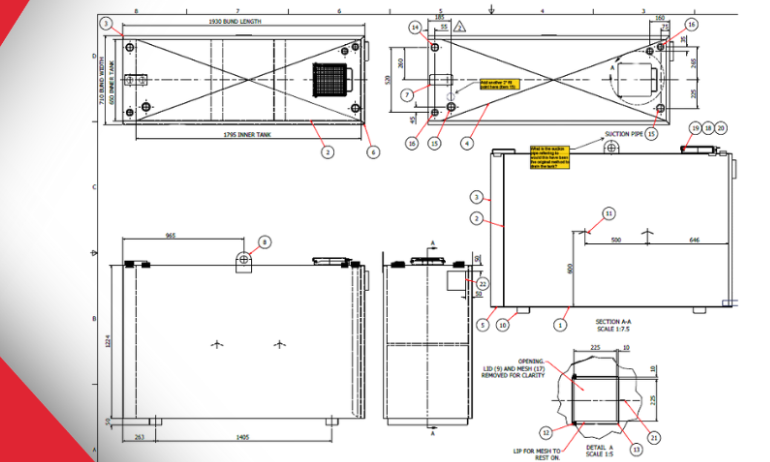
Pay on your own terms with Mondu

Frequently Asked Questions
Fuel Dispensing Tanks
Fuel Management Systems
What is a fuel management system?
A fuel management system is a device or software application that is used to track and monitor fuel consumption and usage in vehicles, equipment, or machinery. It is designed to help businesses, fleet managers, and individuals better understand how much fuel is being used and where it is being used, in order to optimize fuel efficiency and reduce costs.
The system typically includes sensors that are installed on the vehicle or equipment to measure fuel consumption and usage, as well as a central control unit or software application that collects and processes this data. The data collected by the sensors is transmitted to the central control unit or software application in real-time, allowing users to track fuel usage and consumption in real-time.
The central control unit or software application includes a user interface, such as a dashboard or app, which provides real-time data and analytics on fuel usage and consumption. The user interface allows users to view fuel consumption data in various formats, such as graphs, charts, and reports. This data can be used to identify trends and patterns in fuel usage and consumption, and to identify areas where fuel efficiency can be improved.
Some fuel management systems also offer features such as alerts for low fuel levels, route optimization to reduce fuel consumption, and the ability to track fuel costs and compare them to budgeted amounts. These features can help businesses and individuals make more informed decisions about fuel usage, leading to significant cost savings over time.
In addition to tracking and monitoring fuel consumption, some fuel management systems also include features such as fuel theft prevention and fuel budgeting. Fuel theft prevention features can help businesses and individuals detect and prevent unauthorized fuel usage, which can lead to significant cost savings. Fuel budgeting features allow users to set budget limits for fuel usage and track fuel costs against these limits, helping to control fuel expenses and improve overall financial management.
Overall, a fuel management system is an essential tool for businesses, fleet managers, and individuals who want to optimize fuel efficiency, reduce costs, and improve overall financial management. It provides real-time data and analytics on fuel usage and consumption, and offers a range of features to help users make more informed decisions about fuel usage and improve overall fuel efficiency.
What is the difference between the Piusi fuel management system and the B.SMART fuel management system?
The difference between these units is the way you are able to access the unit.
The Piusi Cube 70MC Fuel Management System and the Piusi MC Box Management System are the range of fuel management systems that require user keys and a manager key to be able to extract the data.
This system requires each user to assisned a yellow key fob (This can be allocated to a person or registration number) - this will allow access and link the usage to the individual.
Once this data has been stored on the box the person incharge of extracting the data will use the manager key with the unit. Once the manager key has been been used with the box you will then take it to your computer and use it with the key fob reader.
The key fob reader will come with your software package and this will allow you to store your data and also collab and run reports.
The Piusi Cube MC B.SMART Fuel Management System and the Piusi MC Box B.Smart Fuel Management System are a range of systems that dont require any user key fobs. Instead these use a phone app and user licenses to allow access to the pump.
These systems are connect via bluetooth and uses the phones mobile data to record and store the data.
The B.Smart unit is a cloud based system and no software needs to be purchased to be able to store and view the data instead you log onto a website to find everything. There is no ongoing subscriptions fees for this unit and the website access is included in the cost of the unit.
If your tank is located in a place where wifi isnt available then your system is able to hotspot using a mobile phone to get the data to the cloud.
What are the benefits of a Fuel Management System?
There are many benefits to a Fuel Management System being installed.
The main benefit of the system is the pump security. The Fuel Management System allows you to add and remove users’ ability to use the pump as per your requirements.
The key fob system or the user licences system (B.SMART phone app) will give you control of who can use the system and eliminate the worry of unauthorised users for dispensing fuel.
By using these systems, it gives you the ability to add a user and stop a user from using the pump whenever you need to. If any key fobs or mobile phones go missing with approval to use the pump you can easily inactivate these to prevent the possibility of fuel going missing.
Another benefit this system has been the ability to shut off the pump when out of hours and holiday periods when no one will be on site. This is does very easily on the software on your desktop.
Another key benefit for the admin perspective will be when the users dispense fuel, the transactions are logged and transferred to the desktop software which will allow you to run reports. These reports are useful because they will show dates, times and litres dispensed so every litre can be accounted for. Any missing litres you will easily be able to check the report and find out why.
You can also add a reference option (such as registration number) for more information to what the fuel is being used for.
Lastly, this system also allows you to cap the usage for drivers. If you only require your driver to use 30 litres then you can assign the pump to cut out once 30 litres has been dispensed, and if you don't find it important for your user to see the litres dispensed you can turn this feature off (Good for companies who prefer the users to fill until full)
How does a Fuel Management System protect my fuel?
A fuel management system protects your fuel by only allowing access to authorised persons.
The system allows you to assign key fobs (standard fuel management system) or mobile app licenses (B.SMART system) to certain users to grant them access to the pump and the fuel.
This access can also be stopped at any time to add further protection by deactivating the fobs or licenses at any time (usually in the case of an employee leaving the business or one going missing).
The computer system also gives you many benefits to protect your fuel such as:
- Setting a fuel limit for users so they can overfill or underfill their vehicles.
- Ability to disable the pump in the evenings or holidays.
- Add extra references so the user must provide a reason as to why they are dispensing the fuel

 Login
Login